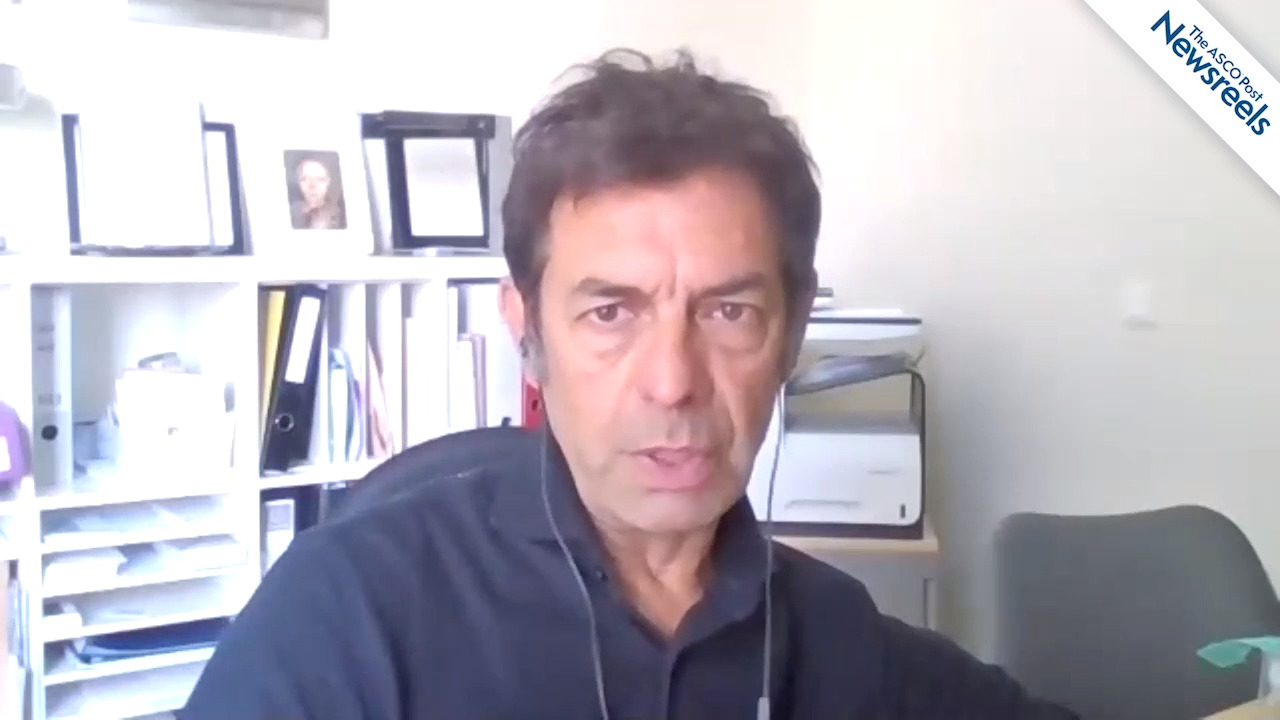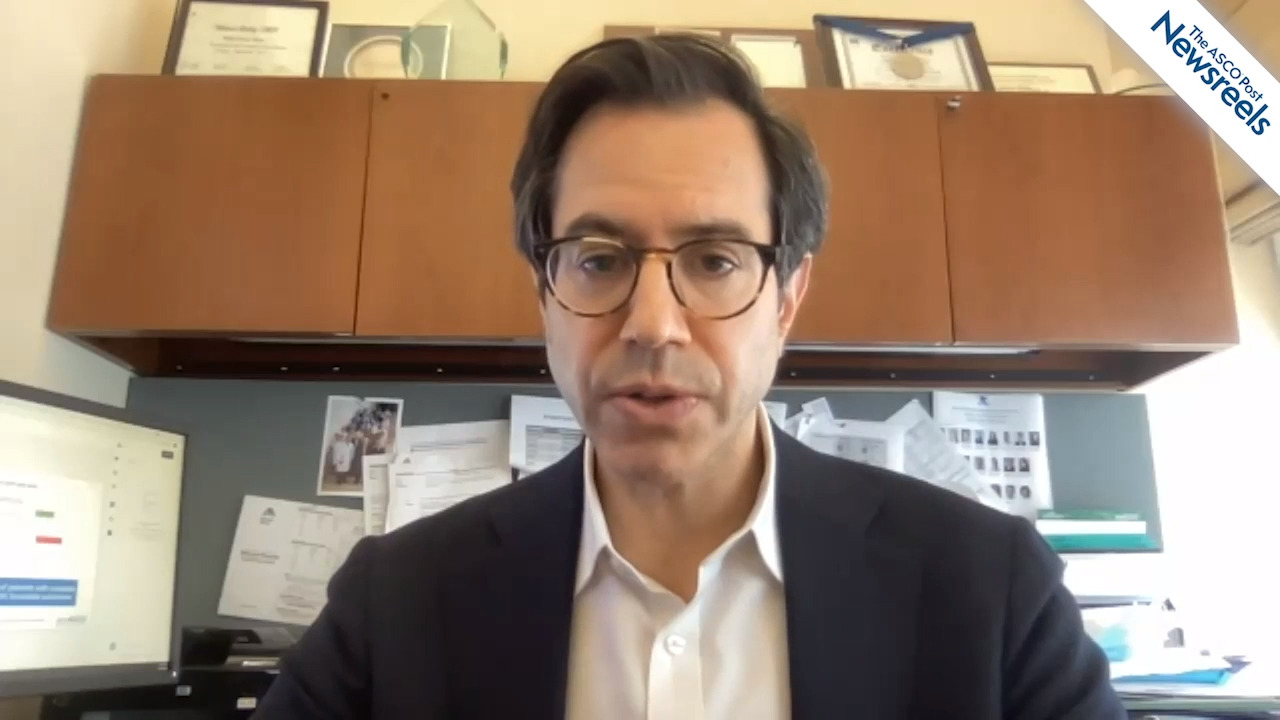Axicabtagene Ciloleucel for Relapsed or Refractory Follicular Lymphoma
On March 5, 2021, the CD19-directed genetically modified autologous T-cell immunotherapy axicabtagene ciloleucel was granted accelerated approval for treatment of adults with relapsed or refractory follicular lymphoma after two or more lines of systemic therapy.1,2 Axicabtagene ciloleucel is...
Addition of Ipilimumab to Nivolumab in Previously Treated, Immunotherapy-Naive Patients With Stage IV Squamous NSCLC
As reported in JAMA Oncology by Scott N. Gettinger, MD, and colleagues, the phase III Lung Cancer Master Protocol S1400I trial showed no improvement in overall survival with the addition of ipilimumab to nivolumab in previously treated, immune checkpoint inhibitor–naive patients with stage IV...
Expert Point of View: Carol Aghajanian, MD
“The phase III ENGOT/GCIG study1 proved to be negative, with no advantage seen with the extension of bevacizumab treatment,” said the abstract’s invited discussant, Carol Aghajanian, MD, Chief of the Medical Gynecologic Oncology Service at Memorial Sloan Kettering Cancer Center, New York. Dr....
Bevacizumab in Advanced Ovarian Cancer: Phase III Trial Finds More Is Not Better
In advanced ovarian cancer, the duration of maintenance bevacizumab should remain 15 months, according to the European multicenter phase III ENGOT/GCIG trial. These results were presented during the 2021 ASCO Annual Meeting by Jacobus Pfisterer, MD, PhD, of the AGO Study Group and Gynecologic...
Interleukin-2 Pathway Agonist Bempegaldesleukin Plus Nivolumab in the First-Line Treatment of Metastatic Melanoma
In the phase II cohort of a phase I/II trial (PIVOT-02) reported in the Journal of Clinical Oncology, Adi Diab, MD, and colleagues found that the combination of the interleukin-2 pathway agonist bempegaldesleukin and nivolumab produced high response rates and extended progression-free survival in...
Pembrolizumab/Lenvatinib Granted Regular Approval for Advanced Endometrial Carcinoma
On July 21, 2021, the U.S. Food and Drug Administration (FDA) approved pembrolizumab (Keytruda) in combination with lenvatinib (Lenvima) for patients with advanced endometrial carcinoma that is not microsatellite instability–high (MSI-H) or mismatch repair–deficient (dMMR). These patients must have ...
Efficacy of Dendritic Cell Vaccines Plus Standard Therapy for Breast Cancer
A report published by Oba et al in the Journal for ImmunoTherapy of Cancer shares new data on combining standard treatment for breast cancer with a particular form of cancer immunotherapy—dendritic cell vaccines. The study is reportedly the first to demonstrate that in situ dendritic cell vaccines...
Addition of Prime-Boost Vaccination Regimen to Atezolizumab in Soft-Tissue Sarcomas Expressing NY-ESO-1
In a phase II trial reported in the Journal of Clinical Oncology, Sant P. Chawla, MD, and colleagues found that the addition of the heterologous prime-boost vaccination regimen CMB305 to atezolizumab did not improve survival outcomes in patients with soft-tissue sarcomas expressing the...
Combination Ficlatuzumab and Cytarabine Show Clinical Activity in Relapsed/Refractory AML
Despite advances in the treatment of acute myeloid leukemia (AML), only 29.5% of patients with the cancer are alive 5 years after diagnosis. Even with aggressive therapy, just 30% of patients achieve a complete remission with a median survival of 7.5 months, making it imperative to develop novel...
Atezolizumab Plus Bevacizumab in Malignant Peritoneal Mesothelioma
A phase II study published by Kanwal Raghav, MBBS, MD, and colleagues in Cancer Discovery found that combination treatment with the PD-L1 inhibitor atezolizumab and the VEGF inhibitor bevacizumab was well tolerated and resulted in a 40% objective response rate in patients with advanced malignant...
Adding Perioperative Durvalumab to Neoadjuvant Chemotherapy in Stage IIIA NSCLC
In a Swiss phase II trial (SAKK 16/14) reported in the Journal of Clinical Oncology, Rothschild et al found that the addition of perioperative durvalumab to neoadjuvant cisplatin/docetaxel resulted in a high major pathologic response rate and an event-free survival rate of 73% in patients with...
HER2-Specific CAR T-Cell Trial Addresses Pediatric Brain and Spinal Cord Tumors
Locoregional delivery of chimeric antigen receptor (CAR) T cells has resulted in objective responses in adults with glioblastoma, but the approach has not been evaluated in pediatric patients with brain and central nervous system tumors. The innovative, ongoing phase I BrainChild-01 trial is...
Real-World Survival Outcomes With Pertuzumab Plus T-DM1 for HER2-Positive Metastatic Breast Cancer
In a Canadian population-based retrospective cohort study reported in JAMA Oncology, Ethier et al identified real-world survival outcomes among women receiving pertuzumab and trastuzumab emtansine (T-DM1) for stage IV HER2-positive breast cancer, observing that outcomes appeared to be poorer than...
Evandro de Azambuja, MD, PhD, Discusses the Short-HER Trial
Invited discussant of the Short-HER trial, Evandro de Azambuja, MD, PhD, Head of the Medical Support Team at the Institut Jules Bordet, Brussels, acknowledged the good outcomes in low- and intermediate-risk patients treated with either a short or long duration of trastuzumab but said 1 year of the...
Long-Term Analysis of Short-HER Trial of Adjuvant Trastuzumab
Long-term analysis of the Short-HER trial showed that 9 weeks of adjuvant trastuzumab conveyed benefits comparable to a 1-year course in patients with early HER2-positive breast cancer deemed to be at low or intermediate risk for recurrence. High-risk patients, however, derived considerably more...
Study Identifies Gut Microbes Associated With Combination Immunotherapy Response and Adverse Events
Researchers have found that specific intestinal microbiota signatures may correlate with high-grade adverse events and response to combined CTLA-4 and PD-1 blockade treatment. The study, published by Andrews et al in Nature Medicine, also identified a potential new strategy to treat toxicity—while...
DESTINY-Gastric01 Exploratory Biomarker Analysis Examines Efficacy of Trastuzumab Deruxtecan-nxki Among Patients With HER2-Positive and HER2-Low Gastric Cancer
Trastuzumab deruxtecan-nxki demonstrated clinically meaningful benefit across specific subgroups of patients with HER2-positive and HER2-low advanced gastric cancer, according to findings from a post hoc exploratory biomarker analysis presented by Kohei Shitara, MD, and colleagues at the ESMO World ...
Martin H. Dreyling, MD, PhD, on Follicular Lymphoma: Safety and Efficacy of Tisagenlecleucel
Martin H. Dreyling, MD, PhD, of University Hospital Munich Grosshadern Klinikum, discusses phase II results from the ELARA trial, which suggests tisagenlecleucel may be a promising immunotherapy for adults with relapsed or refractory follicular lymphoma (Abstract S210).
FDA Approves Daratumumab and Hyaluronidase-fihj With Pomalidomide and Dexamethasone for Pretreated Patients With Multiple Myeloma
On July 9, the U.S. Food and Drug Administration (FDA) approved daratumumab and hyaluronidase-fihj (Darzalex Faspro) in combination with pomalidomide and dexamethasone for adult patients with multiple myeloma who have received at least one prior line of therapy including lenalidomide and a...
Expert Point of View: Edward B. Garon, MD, MS
Invited discussant of the BOOSTER trial,1 Edward B. Garon, MD, MS, Professor of Medicine and Director of the Thoracic Oncology Program, David Geffen School of Medicine at the University of California Los Angeles, said the study’s research question is appropriate, since osimertinib was established...
Study Finds Bevacizumab Offers No Boost to Second-Line Osimertinib in EGFR T790M–Mutated Lung Cancer
For the second-line treatment of advanced EGFR T790M–mutated non–small cell lung cancer (NSCLC), the performance of osimertinib alone was not found to be different from that of osimertinib plus bevacizumab in the phase II ETOP 10-16 BOOSTER trial, reported at a European Society for Medical...
Expert Point of View: Nicolas Girard, MD, PhD
Invited discussant Nicolas Girard, MD, PhD, of the Curie Institute, Paris, said, “A major challenge in NSCLC is what happens when osimertinib resistance develops.” “A key takeaway point from this study is that the efficacy is driven by resistance mechanism. The overall response rate was 47% in the ...
Amivantamab/Lazertinib Combination May Overcome Osimertinib Resistance in Patients With EGFR-Positive NSCLC
Combination targeting of epidermal growth factor receptor (EGFR) with amivantamab/lazertinib achieved durable responses in more than one-third of chemotherapy-naive patients with EGFR-mutant non–small cell lung cancer (NSCLC) that had progressed on osimertinib, according to a cohort analysis of the ...
Expert Point of View: Jason J. Luke, MD
Invited discussant of the C-144-01 study,1 Jason J. Luke, MD, Associate Professor of Medicine and Director of the Cancer Immunotherapeutics Center, University of Pittsburgh Hillman Cancer Center, Pittsburgh, noted that lifileucel is “clearly an active regimen in the post–PD-1/CTLA-4 setting and one ...
Lifileucel After Disease Progression in Metastatic Melanoma: Durable Responses Achieved in Phase II Trial
Despite the fact that we have made significant progress in metastatic melanoma with immune checkpoint inhibitors—now the standard of care—most patients experience disease progression and are left without approved treatments. There is a need for newer treatments with clinical benefit. Lifileucel, an ...
Nivolumab in Resected Esophageal or Gastroesophageal Junction Cancer
On May 20, 2021, nivolumab was approved for adjuvant treatment of patients with completely resected esophageal or gastroesophageal junction (GEJ) cancer with residual pathologic disease after neoadjuvant chemoradiotherapy.1,2 Supporting Efficacy Data Approval was based on findings from the...
Enfortumab Vedotin-ejfv Granted Regular Approval in Treatment of Locally Advanced or Metastatic Urothelial Cancer
On July 9, 2021, the U.S. Food and Drug Administration (FDA) approved enfortumab vedotin-ejfv (Padcev), a Nectin-4–directed antibody and microtubule inhibitor conjugate, for adults with locally advanced or metastatic urothelial cancer who have previously received a PD-1 or PD-L1 inhibitor and...
BCMA-Directed CAR T-Cell Therapy Ciltacabtagene Autoleucel in Relapsed or Refractory Multiple Myeloma
In the phase Ib/II CARTITUDE-1 trial reported in The Lancet, Jesus G. Berdeja, MD, and colleagues found that ciltacabtagene autoleucel (cilta-cel), a chimeric antigen receptor (CAR) T-cell therapy with two B-cell maturation antigen (BCMA)-targeting single-domain antibodies, produced a high rate of...
Addition of Pembrolizumab to Chemoradiotherapy in Total Neoadjuvant Therapy for Locally Advanced Rectal Cancer
As reported in JAMA Oncology by Osama E. Rahma, MD, and colleagues, initial results of the phase II NRG-GI002 trial showed no improvement in mean neoadjuvant rectal score with the addition of pembrolizumab to chemoradiotherapy in total neoadjuvant therapy for patients with locally advanced rectal...
FDA Approves Expanded Indication for Pembrolizumab in Locally Advanced Cutaneous Squamous Cell Carcinoma
On July 6, the U.S. Food and Drug Administration (FDA) approved an expanded label for pembrolizumab, an anti–PD-1 agent, as monotherapy for patients with locally advanced cutaneous squamous cell carcinoma that is not curable by surgery or radiation. This approval is based on data from the second...
Humanized CD19-Targeted CAR T-Cell Treatment in Patients With Relapsed or Refractory B-Cell ALL
In a pilot study reported by Myers et al in the Journal of Clinical Oncology, a humanized CD19-targeted chimeric antigen receptor (CAR) T-cell product developed by the investigators (huCART19) was found to produce durable remissions and prolonged CAR T-cell persistence in CAR-naive and CAR-exposed...
A Shift in the Treatment of Advanced Melanoma
Answers to questions about first-line treatment of metastatic melanoma are “going to be shifting,” Jason J. Luke, MD, told The ASCO Post, with the change coming on the heels of the phase III RELATIVITY-047 trial reported at the 2021 ASCO Annual Meeting.1 That abstract reported that using two...
Responses to Pembrolizumab and Ipilimumab After Anti–PD-1/L1 Failure in Advanced Melanoma
Despite new and effective treatments for melanoma with checkpoint inhibitors and targeted therapies, patients with metastatic melanoma who progress on frontline treatment generally do very poorly. “We really need to make sure we give these patients access to drugs that we know have some efficacy,”...
CheckMate 648: First-Line Nivolumab Regimens Improve Survival in Esophageal Squamous Cell Carcinoma
As first-line treatment of advanced esophageal squamous cell carcinoma, nivolumab-containing regimens improved overall survival over standard-of-care chemotherapy, according to the first results of the global phase III CheckMate 648 trial presented at the 2021 ASCO Annual Meeting by Ian Chau, MD,...
Loncastuximab Tesirine-lpyl for Relapsed or Refractory Large B-Cell Lymphoma
On April 23, 2021, loncastuximab tesirine-lpyl, a CD19-directed antibody and alkylating agent conjugate, was granted accelerated approval for treatment of adult patients with relapsed or refractory large B-cell lymphoma after two or more lines of systemic therapy, including diffuse large B-cell...
KEYNOTE-564: Adjuvant Pembrolizumab Extends Disease-Free Survival in High-Risk Renal Cell Carcinoma
Adjuvant pembrolizumab following surgery significantly improved disease-free survival compared with placebo among patients with high-risk clear cell renal cell carcinoma (RCC), according to the international phase III KEYNOTE-564 study presented at the Plenary session during the 2021 ASCO Annual...
Martin Hutchings, MD, PhD, on Hodgkin Lymphoma: Brentuximab Vedotin With Chemotherapy
Martin Hutchings, MD, PhD, of Copenhagen University Hospital, discusses a 5-year update of the phase III ECHELON-1 study, which suggested brentuximab vedotin plus doxorubicin, vinblastine, and dacarbazine benefits patients with previously untreated stage III or IV classical Hodgkin lymphoma (Abstract S205).
Philippe Moreau, MD, on Newly Diagnosed Multiple Myeloma: Daratumumab Maintenance vs Observation
Philippe Moreau, MD, of University Hospital Hôtel-Dieu, discusses findings from the CASSIOPEIA trial, Part 1, on daratumumab maintenance vs observation in patients with newly diagnosed multiple myeloma who have been treated with bortezomib, thalidomide, and dexamethasone, with or without daratumumab, and autologous stem cell transplantation (Abstract S180).
ctDNA and Early Relapse After Axicabtagene Ciloleucel Infusion in Large B-Cell Lymphoma
In a prospective study reported in the Journal of Clinical Oncology, Frank et al found that monitoring of circulating tumor DNA (ctDNA) improved detection of early relapse after axicabtagene ciloleucel infusion in patients with relapsed or refractory large B-cell lymphoma. Study Details A total of...
Bijal D. Shah, MD, on CLL: CAR T-Cell Therapy With Brexucabtagene Autoleucel
Bijal D. Shah, MD, of the H. Lee Moffitt Cancer Center, discusses phase II results of the ZUMA-3 study, which evaluated brexucabtagene autoleucel (KTE-X19), an anti-CD19 CAR T-cell therapy, in adults with relapsed or refractory B-cell acute lymphoblastic leukemia (Abstract 7002).
Martin Reck, MD, PhD, on NSCLC: Nivolumab, Ipilimumab, and Chemotherapy for Advanced Disease
Martin Reck, MD, PhD, of LungenClinic, discusses a 2-year update of the CheckMate 9LA study, which sought to determine whether nivolumab plus ipilimumab combined with two cycles of chemotherapy is more effective than four cycles of chemotherapy alone as a first-line treatment for patients with stage IV non–small cell lung cancer (Abstract 9000).
Peter H. O’Donnell, MD, on Urothelial Cancer: First-Line Pembrolizumab in Cisplatin-Ineligible Patients
Peter H. O’Donnell, MD, of The University of Chicago, discusses response and survival results from the phase II KEYNOTE-052 study, which showed that after up to 5 years of follow-up, pembrolizumab continued to elicit clinically meaningful, durable antitumor activity in cisplatin-ineligible patients with advanced urothelial cancer (Abstract 4508).
Matt D. Galsky, MD, on Bladder Cancer: Neoadjuvant Therapy With Gemcitabine, Cisplatin, and Nivolumab
Matt D. Galsky, MD, of the Tisch Cancer Institute at Icahn School of Medicine at Mount Sinai, discusses results from a phase II trial designed to test gemcitabine and cisplatin plus nivolumab as neoadjuvant therapy in patients with muscle-invasive bladder cancer and to better predict benefit in those who opted out of cystectomy (Abstract 4503).
Phase II Study of Naratuximab Emtansine Plus Rituximab in DLBCL
Adding the antibody-drug conjugate naratuximab emtansine to rituximab resulted in favorable overall survival and complete response rates for patients with relapsed or refractory diffuse large B-cell lymphoma (DLBCL), with a manageable safety profile. These findings from a phase II study were...
Avelumab With or Without Pegylated Liposomal Doxorubicin in Platinum-Resistant/Refractory Ovarian Cancer
As reported in The Lancet Oncology by Eric Pujade-Lauraine, MD, and colleagues, the phase III JAVELIN Ovarian 200 trial showed no significant improvement in progression-free or overall survival with avelumab alone or in combination with pegylated liposomal doxorubicin (PLD) vs PLD alone in patients ...
Is Lenvatinib Plus Pembrolizumab an Effective Treatment for Patients With Metastatic Renal Cell Carcinoma?
As reported in The Lancet Oncology by Chung-Han Lee, MD, and colleagues, findings in a cohort of the phase Ib/II Study 111/KEYNOTE-146 trial showed that the combination of lenvatinib and pembrolizumab produced high response rates among patients with metastatic clear cell renal cell carcinoma...
Brexucabtagene Autoleucel in Adults With Relapsed or Refractory B-Cell ALL: ZUMA-3
As reported in The Lancet by Shah et al, the pivotal phase II ZUMA-3 trial has shown a high rate of complete remission with the autologous anti-CD19 chimeric antigen receptor (CAR) T-cell therapy brexucabtagene autoleucel (formerly KTE-X19) in adults with relapsed or refractory B-cell acute...
Addition of Isatuximab-irfc to Carfilzomib/Dexamethasone in Relapsed or Refractory Multiple Myeloma: IKEMA Trial
As reported in The Lancet by Philippe Moreau, MD, and colleagues, the phase III IKEMA trial has shown that the addition of the anti-CD38 antibody isatuximab-irfc to carfilzomib and dexamethasone resulted in significantly improved progression-free survival in patients with relapsed or refractory...
Sibylle Loibl, MD, PhD, on Triple-Negative Breast Cancer: Improving Long-Term Outcomes With Durvalumab
Sibylle Loibl, MD, PhD, of the German Breast Group, discusses results from the phase III GeparNUEVO study, which investigated neoadjuvant durvalumab in addition to anthracycline/taxane-based neoadjuvant chemotherapy in patients with early triple-negative breast cancer (Abstract 506).
Addition of First-Line Nivolumab to Chemotherapy in Advanced Gastric Cancers: CheckMate 649
As reported in The Lancet by Yelena Y. Janjigian, MD, and colleagues, the phase III CheckMate 649 trial has shown that the addition of first-line nivolumab to chemotherapy resulted in improved overall and progression-free survival among patients with advanced HER2-negative gastric, gastroesophageal ...








